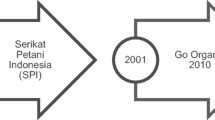Abstract
In 2016, summarily outlawing all chemical inputs, the Indian state of Sikkim transitioned to completely organic agriculture. Despite “organic discontents” of farmers and citizens about autocratic implementation, lowered yields, and unsatisfactory prices, “Sikkim Organic” enjoys global accolades and local compliance. The paradox of alternative agriculture in the Global South is that it is often promoted by the same state-science-capital hegemonic formation that pushed the conventional paradigm. How has the Sikkimese state negotiated this paradox and continued to claim success, when other radical state-led organic transformations have failed? Recent scholarship advocates for contextual definitions of organic success, beyond the parameters of yield and profit. They examine the socio-political concerns of farmers, middlemen and consumers that shape their engagement with the phenomenon. This lens is seldom applied to the state. Drawing on ethnographic conversations with farmers, local consumers, state officials and discourse analysis of governmental literature and speeches, this article analyzes the Sikkimese state’s efforts at consolidating its hegemony as a process of political brand-building. Highlighting the cultural aspects of policy implementation, it analyzes the affective resonances about traditional agrarian practices and about the morality of organic markets that the state discursively creates to support its organic regime. This extends the critique of the state beyond the focus on governmentality and neoliberalization through state-led certification/standardization. The article neither absolves the state of its failures nor dismisses the potential of progressive organic policies. It shows the significance of contextual cultural-political framings in determining outcomes of large-scale experiments towards sustainable agrarian futures.


Similar content being viewed by others
Notes
The Indian state grants affirmative action to disadvantaged communities based on their lower caste or tribal status and their historic economic backwardness. 33% of Sikkim’s population, comprising of the Bhutia, Lepcha, Limboo, Tamang, Sherpa ethnic groups are recognized officially as “Scheduled Tribes”. “Scheduled Castes” like the Kami, Damai and Sarki constitute about 4.6% of the population. Various other ethnic groups like Rai, Gurung, Magar, Chettri, Bahun, Newar are also seeking either “Other Backward Classes” or “Scheduled Tribes” status, to avail of targeted educational and economic opportunities provided by the state.
See Kantor (2020) for a rich description of how rural Indians fluidly move between these positions and temporary urban employment, making a definition of a farmer particularly permeable.
as part of the Group of Twenty (G20) Forum for International Economic Cooperation.
The central government dealing with the regional state similarly circumscribed its own role to “representation in the service of attracting capital.” The latter sought INR 43,589 as aid for 2016-21, to underwrite the risks of its organic transition (Sikkim Express, 2016). The PM positioned his government as the investment-facilitator building the only airport in Sikkim (operational since 2018). His 2016 speech claimed that “everyday cargo filled with fruits and flowers can leave the state. Sikkim can scale new heights. Infrastructure development will take care of the needs of the farmer.”.
References
Aistara, G. (2018). Organic Sovereignties: Struggles Over Farming in an Age of Free Trade. University of Washington Press.
Altieri, M. A. (2009). Agroecology, small farms, and food sovereignty. Monthly Review, 61(3), 102–113.
ANI. (2016). Twitter Post. Retrieved on August 28, 2020, from, https://twitter.com/ANI/status/689071357078958080.
Avashte, R., et al. (2016). Transforming rural Sikkim. Sikkim organic mission. Government of India.
Bauer, H., et al. (2013). The effects of organic labels on global, local, and private brands: More hype than substance? Journal of Business Research, 66(8), 1035–1043. https://doi.org/10.1016/j.jbusres.2011.12.028
Besky, S. (2014). The Darjeeling Distinction: Labor and Justice on Fair-Trade Tea Plantations in India. University of California Press.
Bhatt, A., & John, J. (2023). Including farmers’ welfare in a government-led sector transition: The case of Sikkim’s shift to organic agriculture. Journal of Cleaner Production, 411, 137207. https://doi.org/10.1016/j.jclepro.2023.137207
Bhutia, D. T. (2015). Sikkim organic mission journey of a fully organic state. Department of Food Security & Agriculture Development and Horticulture and Cash Crops Development Government of Sikkim, Gangtok.
Bonisoli, L., et al. (2023). Going green in Ecuador: Unpacking the motivations behind brand loyalty for organic products. Journal of Cleaner Production, 418, 138116. https://doi.org/10.1016/j.jclepro.2023.138116
Brown, T. (2018). Farmers, Subalterns, and Activists: Social Politics of Sustainable Agriculture in India. Cambridge University Press.
Brown, W. (2015). Undoing the Demos: Neoliberalism’s Stealth Revolution. Zone Books.
Buck, D., et al. (1997). From farm to table: The organic vegetable commodity Chain of Northern California. Sociologia Ruralis, 37(1), 3–20. https://doi.org/10.1111/1467-9523.00033
Campbell, H., & Rosin, C. (2011). After the organic industrial complex: An ontological expedition through commercial organic agriculture in New Zealand. Journal of Rural Studies, 27(4), 350–361.
Choudhury, R. (2018). Sikkim Dumps 10 Tonnes of Vegetables, Fruits in a Bid to Go Completely Organic. Retrieved on January 10, 2023, from https://www.ndtv.com/indianews/sikkim-dumps-10-metric-ton-of-vegetables-fruits.
Sikkim Chronicles. (2023). B20 Brings Rs 100 Cr Investment Interest. Retrieved July 22, 2023, from, https://www.thesikkimchronicle.com/b20-brings-rs-1000-cr-investment-interest-investor-friendly-policies-to-be-framed-sikkim-cm/.
Dhanagare, D. N. (1988). The green revolution and social inequalities in rural India. Bulletin of Concerned Asian Scholars, 20(2), 2–13.
ENVIS. (2022). Agriculture in Sikkim. Retrieved July 20, 2023, from https://sikenvis.nic.in/Database/Agriculture_777.aspx.
Sikkim Express. (2015). Conference to Encourage Food Entrepreneurs of Sikkim. Retrieved July 22, 2023, from https://www.facebook.com/sikkimexpress/posts/conference-to-encourage-food-entrepreneurs-of-sikkimgovernorshriniwas-patil-wou/786550628157618/
Sikkim Express. (2016). Sikkim Seeks Rs. 43,589 Cr Developmental Package.
Flachs, A. (2019). Cultivating Knowledge: Biotechnology, Sustainability, and the Human Cost of Cotton Capitalism in South India. The University of Arizona Press.
Flachs, A., & Panuganti, S. (2020). Organic aspirations in South India. Economic Anthropology, 7(1), 38–50.
Fouilleux, E., & Loconto, A. (2017). Voluntary standards, certification, and accreditation in the global organic agriculture field: A tripartite model of techno-politics. Agriculture and Human Values, 34(1), 1–14. https://doi.org/10.1007/s10460-016-9686-3
Galvin, S. S. (2014). Organic designs and agrarian practice in Uttarakhand, India. Culture, Agriculture, Food and Environment, 36(2), 118–128.
Galvin, S. S. (2021). Becoming Organic: Nature and Agriculture in the Indian Himalaya. Yale University Press.
Gibbon, P. (2008). An analysis of standards-based regulation in the EU organic sector, 1991–2007. Journal of Agrarian Change, 8(4), 553–582.
Government of Sikkim. (2003). Sikkim organic mission—policy, vision, mission. Government of Sikkim. Retrieved July 20, 2023, from https://sikkim.gov.in/Mission/Mission-info/1?Mission=Sikkim%20Organic%20Mission
Government of Sikkim. (2019). Organic Farming in Sikkim as a Strategy for Sustaining Ecosystem Services and Livelihoods. Department of Information and Public Relations.
Graan, A. (2013). Counterfeiting the nation? Skopje 2014 and the politics of nation branding in Macedonia. Cultural Anthropology, 28(1), 161–179. https://doi.org/10.1111/j.1548-1360.2012.01179.x
Gurung, R., & Choubey, M. (2021). Integrating farmer producer organisations in Sikkim organic mission: Opportunities, challenges, policy measures. South Asian Journal of Social Studies and Economics, 9(1), 39–49.
Guthman, J. (2014). Agrarian Dreams: The Paradox of Organic Farming in California. University of California Press.
Guthman, J. (1998). Regulating meaning, appropriating nature: The codification of California organic agriculture. Antipode, 30(2), 135–154.
Kantor, H. (2020). Locating the farmer: Ideologies of agricultural labor in Bihar. India. Anthropology of Work Review, 41(2), 97–107. https://doi.org/10.1111/awr.12208
Lade**sky, W. (1970). Ironies of India’s green revolution. Foreign Affairs, 48(4), 758–768.
Laforge, J. M. L., et al. (2017). Governments, grassroots, and the struggle for local food systems: Containing, coopting, contesting and collaborating. Agriculture and Human Values, 34(3), 663–681.
Larsson, T. (2015). The rise of the organic foods movement as a transnational phenomenon. In R. J. Herring (Ed.), The Oxford Handbook of Food, Politics, and Society (pp. 739–752). Oxford University Press.
Liao, Y. (2020). Residual governmentality: Pesticide policing in neo-socialist China. The Asia Pacific Journal of Anthropology, 21(5), 416–433.
Luetchford, P., & Pratt, J. (2011). Values and markets: An analysis of organic farming initiatives in Andalusia. Journal of Agrarian Change, 11(1), 87–103.
McDuie-Ra, D. (2012). Northeast Migrants in Delhi: Race, Refuge and Retail. Amsterdam University Press.
East Mojo. (2023). In Sikkim, the Move to Organic is Faltering. Retrieved March 10, 2023, from https://www.eastmojo.com/sikkim/2023/06/25/in-sikkim-the-move-to-organic-is-/.
Münster, D. (2016). Agro-ecological double movements? Zero budget natural farming and alternative agricultures after the Neoliberal Crisis in Kerala. In B. B. Mohanty (Ed.), Critical Perspectives on Agrarian Transition (pp. 222–244). Routledge India.
Nakassis, C. V. (2013). Brands and their surfeits. Cultural Anthropology, 28(1), 111–126. https://doi.org/10.1111/j.1548-1360.2012.01176.x
Nikol, L. J., & Jansen, K. (2021). Rethinking conventionalisation: A view from organic agriculture in the Global South. Journal of Rural Studies, 86(August), 420–429.
Palackal, A. (2019). Organic agriculture in Kerala: A counter-discourse from the margins. Sociological Bulletin, 68(2), 169–182.
Parvaiz, A. (2016). India’s first fully organic state faces many challenges. The Earth Island Journal. Retrieved January 20, 2023 from, https://www.earthisland.org/journal/index.php/articles/entry/indias_first_fully-organic_state_faces_many_challenges/.
The Print. (2023). Sikkim’s Lone PadmaShri Winner, 98-Year-Old Tularam Upreti has been Championing Organic Farming for 80 Years. Retrieved January 20, 2023, from https://theprint.in/india/sikkims-lone-padma-shri-winner-98-year-old-tula-ram-upreti-has-been-championing-organic-farming-for-80-years/1337149/.
Ryan, J., & Casidy, R. (2018). The role of brand reputation in organic food consumption: A behavioral reasoning perspective. Journal of Retailing and Consumer Services, 41, 239–247.
Schewe, R. L. (2015). Letting go of ‘conventionalisation’: Family labour on New Zealand organic dairy farms. Sociologia Ruralis, 55(1), 85–105.
Sen, D. (2017). Everyday Sustainability: Gender Justice and Fair-Trade Tea in Darjeeling. State University of New York Press.
Shiva, V. (2016). Violence of the Green Revolution: Third World Agriculture, Ecology, and Politics. University Press of Kentucky.
Smith, S. H., & Gergan, M. (2015). The diaspora within: Himalayan youth, education-driven migration, and future aspirations in India. Environment and Planning d: Society and Space, 33(1), 119–135. https://doi.org/10.1068/d13152p
Stone, G. D. (2018). Agriculture as spectacle. Journal of Political Ecology, 25(1), 656–685. https://doi.org/10.2458/v25i1.22385
Taneja, S. (2017). Sikkim is 100% Organic! Take a Second Look. Down to Earth. Retrieved January 22, 2023, from https://www.downtoearth.org.in/news/agriculture/organic-trial-57517.
The Sikkim Agricultural, Horticultural Input and Livestock Feed Regulatory Act. (2014). https://prsindia.org/files/bills_acts/acts_states/sikkim/2014/2014Sikkim10.pdf.
Toop, G. (2022). The state that proved it’s possible to go 100% organic. Greenpeace. Retrieved January 18, 2023, from https://www.greenpeace.org/aotearoa/story/the-state-that-proved-its-possible-to-go-100-organic/.
Trauger, A. (2014). Toward a political geography of food sovereignty: Transforming territory, exchange and power in the liberal sovereign state. Journal of Peasant Studies, 41(6), 1131–1152. https://doi.org/10.1080/03066150.2014.937339
Varagur, K. (2016). This Indian State now has only Organic Farms. Huffington Post. Retrieved January 18, 2023, from https://www.huffpost.com/entry/sikkim-100-percent-organic_n_569eb194e4b0cd99679bc649.
Funding
Funding was supported by University of Chicago.
Author information
Authors and Affiliations
Corresponding author
Additional information
Publisher's Note
Springer Nature remains neutral with regard to jurisdictional claims in published maps and institutional affiliations.
Rights and permissions
Springer Nature or its licensor (e.g. a society or other partner) holds exclusive rights to this article under a publishing agreement with the author(s) or other rightsholder(s); author self-archiving of the accepted manuscript version of this article is solely governed by the terms of such publishing agreement and applicable law.
About this article
Cite this article
Das, S. Politically Branding India’s “First Fully Organic State”: Re-Signification of Traditional Practices and Markets in Organic Agriculture. J Agric Environ Ethics 36, 20 (2023). https://doi.org/10.1007/s10806-023-09915-9
Accepted:
Published:
DOI: https://doi.org/10.1007/s10806-023-09915-9




